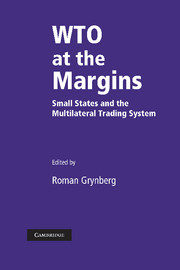Book contents
- Frontmatter
- Contents
- List of figures and appendices
- List of tables
- List of contributors
- Introduction
- Part I Theory and evidence
- 1 A theory of trade and development of small vulnerable states
- 2 Small countries: a survey of the literature
- 3 When comparative advantage doesn't matter: business costs in small economies
- 4 Can small states compete in manufacturing?
- 5 The economics of isolation and distance
- 6 The trade performance of small states
- 7 Small economies and special and differential treatment: strengthening the evidence, countering the fallacies
- Part II WTO and small economies
- Part III WTO dispute settlement
- Part IV Negotiating issues and institutional arrangements
- Index
2 - Small countries: a survey of the literature
Published online by Cambridge University Press: 05 May 2010
- Frontmatter
- Contents
- List of figures and appendices
- List of tables
- List of contributors
- Introduction
- Part I Theory and evidence
- 1 A theory of trade and development of small vulnerable states
- 2 Small countries: a survey of the literature
- 3 When comparative advantage doesn't matter: business costs in small economies
- 4 Can small states compete in manufacturing?
- 5 The economics of isolation and distance
- 6 The trade performance of small states
- 7 Small economies and special and differential treatment: strengthening the evidence, countering the fallacies
- Part II WTO and small economies
- Part III WTO dispute settlement
- Part IV Negotiating issues and institutional arrangements
- Index
Summary
Introduction
The study of the economic consequences of being a small state has received a large amount of attention from policy-makers, academics and researchers over the years. This is due in the main to the many arguments put forward attesting to the economic disadvantages countries suffer as a result of their size. These range from low returns to scale in the private economy to export dependence, increased vulnerability and volatility as well as the costs of isolation.
The objective of this chapter is to review these different strands of the literature taking each of the major areas of interest in turn. After an examination of the different concepts of country size presented in the literature, the author will review the range of constraints to growth for small countries that stem from the limited size of small country domestic markets. These include limits to the ability to develop a manufacturing sector (Pryor, 1972; Banerji, 1977) to financial constraints (Fry, 1982; Khatkhate and Short, 1980) and export dependence (Kuznets, 1960). The literature dealing with the constraints is advanced in both a theoretical way, reminiscent of the earlier literature, and also a more empirically based manner, one that marries both the theoretical and the empirical.
The chapter goes on to look at the literature concerned with the issue of volatility, which arises out of the greater openness characteristic of small country economies, and its possible effects on growth.
- Type
- Chapter
- Information
- WTO at the MarginsSmall States and the Multilateral Trading System, pp. 29 - 73Publisher: Cambridge University PressPrint publication year: 2006



